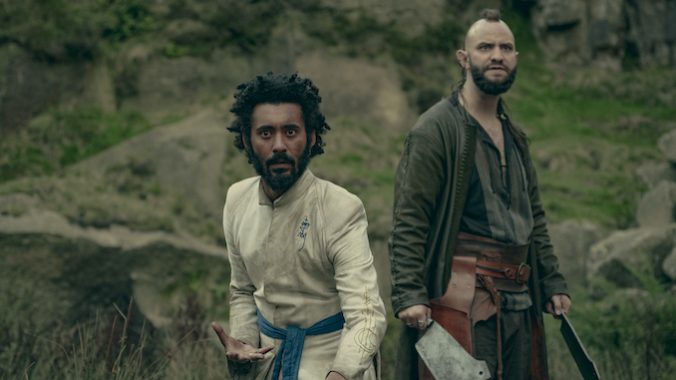The Witcher: Blood Origin Is Little More Than a Middling Dungeons & Dragons Quest Made Into a TV Show
Photo Courtesy of Netflix
Made ostensibly to tide fans over until the next real season of The Witcher, Netflix’s wildly popular fantasy series, The Witcher: Blood Origin (from showrunners Declan de Barra and Lauren Schmidt Hissrich) is set 1,200 years prior to the events of the main series and promises to tell the story of the first Witcher and the Conjunction of the Spheres, the event that merged the worlds of elves, humans, and monsters. Disappointingly, we spend most of the four-episode series in the world of elves, meaning we get a lot of people with pointy ears but much less monster-fighting.
The Witcher: Blood Origin’s overall structure is a lot like that of The Witcher, just on a shorter time frame since we have an entire story to tell in just four episodes. Introduced as a mysterious, shape-shifting figure telling the story to the bard Jaskier (Joey Batey), the series features two main plot points: a band of seven warriors making their way to overthrow the empress Merwyn (Mirren Mack), and the empress herself trying to gain power and fight against the duplicitous Chief Druid Balor (Lenny Henry), who communicates with odd obelisks that serve as gateways between worlds.
By far the most interesting part of the series’ premise is the idea of clashing worlds, which sounds like it would give the story an almost science fiction flare. However, the Conjunction of the Spheres only happens at the very end, so we don’t get to see much of how the worlds of elves, humans, and monsters collide with one another immediately after combining. Instead, we spend a whole lot of time with the elves and some dwarves (who apparently also live in the world of elves), and the occasional portal-hopping monster, but not much else.
The short series focuses a lot on fantasy politics; early on, a thousand-year war between three kingdoms is ended by assassinating the monarchs of all kingdoms, then installing Merwyn as empress. Suspecting that her position is temporary while Balor yearns for the throne, Merwyn spends a lot of the series sneaking around and trying to figure out what Balor is up to, which turns out is talking to an obelisk a lot in order to gain more magical powers.
But the more interesting plot features a packed cast of the aforementioned seven warriors making their way to the capital to overthrow Merwyn, although the reason why doesn’t entirely make sense. Seven is a large number for a main cast, but most of the focus lands on Éile (Sophia Brown), a traveling bard, and Fjall (Laurence O’Fuarain), a warrior who is banished from his kingdom for having an affair with Merwyn. The cast also includes the brilliant Michelle Yeoh as Scian, the last of her tribe of nomadic elves, who sadly doesn’t have much to do in the story. Unfortunately, the other four members come in so late and do so little that they’re not really worth mentioning. The fact that there’s a traveling cast of warriors in a fantasy setting makes the entire story feel a bit like a Dungeons & Dragons campaign, although one that’s seldom exciting.